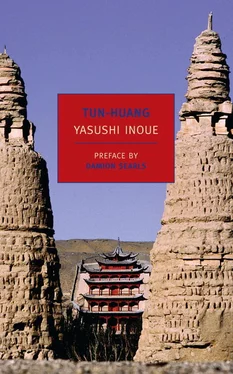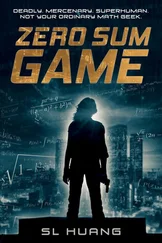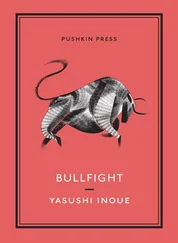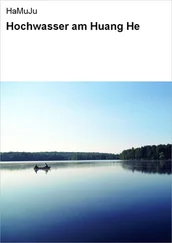Hsing-te raced up a hill. From that vantage point, he saw a fiery column shoot into the air in the wide plains not far from where he stood. Reflected in its glare was the movement of a large cavalry force. This was unmistakably a battle between the main strength of the two armies, but Hsing-te could only see a small portion of the fighting. The scene reflected in the light was only the orderly advance of the cavalry troops thrusting forward; several units emerged from the darkness one moment, and then sank into the shadows again.
Suddenly, the surroundings were illuminated twice as strongly as before. On the hill directly to the right of Hsing-te, another column of fire shot into the air. Simultaneously, frenzied war shouts, eerie and inhuman, rose up in the immediate vicinity. Then Hsing-te saw hundreds of cavalry-men advance; he could see so clearly that he could make out each figure leaning forward in the saddle. The battle cries now rose from all the valleys.
Hsing-te rushed back to his campsite and began to walk, leading his horse. The camels and other horses followed. He felt he must somehow slip out of the battlefield. But there was nothing he could do about it yet. It was too bright. Fierce battles had developed in every direction; a stupendous number of men and horses were in violent motion. Frantically, Hsing-te tried to flee into the shadows. No matter where he went, however, the same scene was repeated. Whether enveloped in darkness or exposed to the blinding light, the battlefields were all around him. When all was dark, the whizzing of arrows penetrated the night with chilling sharpness.
When Hsing-te resigned himself to the fact that he could neither help himself nor the camels and horses, he slackened his pace and meandered along in the direction his feet were pointing. He decided to go on without trying to avoid anything, no matter what obstacles lay ahead. Doing this could not possibly be worse than taking no action at all. Leading his horse, he went alternately from the blinding light of the fiery columns to the pitch-dark shadows, all the while walking steadily in what he thought was a westerly direction. Hsing-te passed through areas strewn with corpses, climbed hills, and cut through marshes.
At daybreak he saw the high walls of a large city rising precipitously before him. Columns of black smoke rose from its walls, veiling the sky. Only the portion immediately above the city wall was soiled by the black smoke, for the rest of the sky shone an unusual crimson. Hsing-te counted the animals which had followed him and let them rest.
Besides his own horse, six camels and twelve horses had trekked after him like faithful retainers. There was a hushed silence.
Hsing-te rested. On the right-hand side of the walled city was a gate. An army was lining up to enter the city. Groups of cavalry alternated with infantry, and it took some time for the whole force to get in.
As soon as everyone had entered, Hsing-te led his own animals toward the gate. After a short distance he stopped again. Another group of troops had appeared a short distance before him. It was clear that they, too, were preparing to enter the city. The group got into formation.
Hsing-te decided to enter first without waiting for this unit. He led the horses and camels to the gate and paused briefly to count heads. Then he passed through the large, stone city gate.
Inside the fortress, he was assailed by the putrid odor of corpses mingled with the usual smell of the battlefield. A street sloped up directly from the gate and at the top of the rise was an open space filled with soldiers.
“Whose army is this?” Hsing-te addressed his first question to a Chinese-looking soldier who walked toward him.
“What?” The soldier glared at Hsing-te. Just then, several others ran toward them shouting, in Chinese, “Clear the road.” Obediently, Hsing-te led the animals to a corner of the open space. The unit he had seen at the gate had just come in.
“Where is this?” Hsing-te repeated his question to another soldier standing nearby.
“What?” This man also scowled fiercely. Soon after, Hsing-te saw several soldiers running forward to make him prisoner. There was a fire somewhere in the garrison, and Hsing-te could see smoke billowing up from the other side of a small grove. He was separated from his animals, and both his arms were pulled by the soldiers dragging him away. The streets were all narrow and uneven.
After some time, Hsing-te and his captors passed what appeared to be the marketplace, where a jumble of small houses stood. Then they entered a quiet residential district with rows of homes surrounded by long mud walls. If it had not been for the recent battle, this city would have been wealthy, peaceful, and bustling. Hsing-te turned many corners, but wherever he went he only saw soldiers. Not a single civilian was in sight.
Before long, Hsing-te was led into a courtyard surrounded by high mud walls. Within it many houses were scattered about, each surrounded by spacious grounds. Soldiers were everywhere. In front of one of these homes, Hsing-te was told to stop and wait.
In no time he was surrounded by a large group of soldiers. They were all Chinese. They all had the same facial bone structure and skin coloring as Hsing-te. They understood the same language, too, but seemed to have no knowledge of China.
Hsing-te asked the first soldier where his native home was, and the man named a place that Hsing-te had not even heard of. And, as if insulted by this question, the soldier struck Hsing-te without warning. More cautiously, Hsing-te made conversation with another man, but he was again beaten and knocked down for no reason.
From then on, whenever Hsing-te opened his mouth he was beaten. He couldn’t understand this at all. As this was going on, a man of about twenty-eight or twenty-nine, who seemed to be a company commander, appeared on the scene. He came to Hsing-te and asked his name, native home, and how he had come to the city.
Hsing-te answered these questions honestly. Whenever he replied, he was dealt a blow. Each time, he felt his whole body float up and became limp, and he fell lightly to the ground. Hsing-te decided not to say anything. He thought it was because he spoke the language that he was in trouble. After he had received a severe beating, his clothes were torn off and replaced with a soldier’s uniform. Hsing-te knew that he looked no different from the rest of the soldiers with his new uniform. He was then taken to a residence a short distance away. Here, too, the courtyard teemed with soldiers. The men, in groups of three or four, were eating as they stood.
Hsing-te was told to wait in a corner of the yard. Once more soldiers surrounded him. Afraid that he would be beaten again, he did not speak. Then one of the men came up to Hsing-te and handed him a bowl of noodles, saying, “Hurry up and eat this. We’re leaving soon.”
“Where are we going?” asked Hsing-te.
But the soldier knew nothing about the destination. He knew only that a battle against the Uighurs was awaiting them. Hsing-te realized then that he had been forced into a military campaign with no knowledge of where he was and whose soldiers surrounded him.
That night Hsing-te was excused from the battle with the Uighurs. Instead, he was assigned with over ten other men to guard the horses in the pastures outside the city. It was then Hsing-te learned that his unit was made up entirely of Chinese soldiers, and that it was the vanguard detachment of the Hsi-hsia. He learned, too, that this town was Liang-chou, which had been completely taken over by the Hsi-hsia, and that the battle last night had been between the Hsi-hsia and the Uighurs, who had come to the aid of the Liang-chou garrison.
Hsi-hsia was determined to launch a full-scale invasion of Liang-chou, even at the risk of war with Sung China, and had succeeded in conquering Liang-chou in only three days.
Читать дальше












